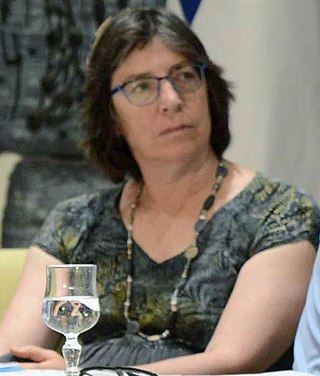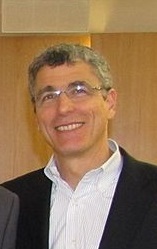Related Research Articles

Conversion to Judaism is the process by which non-Jews adopt the Jewish religion and become members of the Jewish ethnoreligious community. It thus resembles both conversion to other religions and naturalization. The procedure and requirements for conversion depend on the sponsoring denomination. Furthermore, a conversion done in accordance with one Jewish denomination is not a guarantee of recognition by another denomination. Normally, though not always, the conversions performed by more stringent denominations are recognized by less stringent ones, but not the other way around. A formal conversion is also sometimes undertaken by individuals whose Jewish ancestry is questioned or uncertain, even if they were raised Jewish, but may not actually be considered Jews according to traditional Jewish law.

Shlomo Moshe Amar is the former Sephardic Chief Rabbi of Israel. He served in the position of Rishon LeZion from 2003 to 2013; his Ashkenazi counterpart during his tenure was Yona Metzger. Since 2014, he currently serves as the Sephardic Chief Rabbi of Jerusalem.

The Israel Movement for Reform and Progressive Judaism is the organizational branch of Progressive Judaism in Israel, and a member organization of the World Union for Progressive Judaism. It currently has 40 communities and congregations around the state of Israel, 13 of which are new congregations, referred to as "U'faratztah" communities, and two kibbutzim, Yahel and Lotan.
Jewish feminism is a movement that seeks to make the religious, legal, and social status of Jewish women equal to that of Jewish men in Judaism. Feminist movements, with varying approaches and successes, have opened up within all major branches of the Jewish religion.

Women of the Wall is a multi-denominational Jewish feminist organization based in Israel whose goal is to secure the rights of women to pray at the Western Wall, also called the Kotel, in a fashion that includes singing, reading aloud from the Torah and wearing religious garments. Pew Research Center has identified Israel as one of the countries that place "high" restrictions on religion, and there have been limits placed on non-Orthodox streams of Judaism. One of those restrictions is that the Rabbi of the Western Wall has enforced gender segregation and limitations on religious garb worn by women. When the "Women of the Wall" hold monthly prayer services for women on Rosh Hodesh, they observe gender segregation so that Orthodox members may fully participate. But their use of religious garb, singing and reading from a Torah have upset many members of the Orthodox Jewish community, sparking protests and arrests. In May 2013 a judge ruled that a 2003 Israeli Supreme Court ruling prohibiting women from carrying a Torah or wearing prayer shawls had been misinterpreted and that Women of the Wall prayer gatherings at the wall should not be deemed illegal.

The Chief Rabbinate of Israel is recognized by law as the supreme rabbinic authority for Judaism in Israel. The Chief Rabbinate Council assists the two Chief Rabbis, who alternate in its presidency. It has legal and administrative authority to organize religious arrangements for Israel's Jews. It also responds to halakhic questions submitted by Jewish public bodies in the Diaspora. The Council sets, guides, and supervises agencies within its authority.

Women rabbis are individual Jewish women who have studied Jewish Law and received rabbinical ordination. Women rabbis are prominent in Progressive Jewish denominations, however, the subject of women rabbis in Orthodox Judaism is more complex. Although Orthodox women have been ordained as rabbis, many major Orthodox Jewish communities and institutions do not accept the change. In an alternative approach, other Orthodox Jewish institutions train women as Torah scholars for various Jewish religious leadership roles. These roles typically involve training women as religious authorities in Jewish Law but without formal rabbinic ordination, instead, alternate titles are used. Yet, despite this alteration in title, these women are often perceived as equivalent to ordained rabbis. Since the 1970s, over 1,200 Jewish women have been ordained as rabbis.
The first openly lesbian, gay, bisexual, and transgender clergy in Judaism were ordained as rabbis and/or cantors in the second half of the 20th century.

Naamah Kelman-Ezrachi is an American-born Rabbi who was named as Dean of the Hebrew Union College-Jewish Institute of Religion campus in Jerusalem starting in July 2009. In 1992, Kelman made history as the first woman in Israel to become a rabbi when she received her rabbinic ordination from Rabbi Alfred Gottschalk.

Angela Warnick Buchdahl is an American rabbi. She was the first Asian-American to be ordained as a rabbi, and the first Asian-American to be ordained as a hazzan (cantor). In 2011 she was named by Newsweek and The Daily Beast as one of America's "Most Influential Rabbis", and in 2012 by The Daily Beast as one of America's "Top 50 Rabbis". Buchdahl was recognized as one of the top five in The Forward's 2014 "Forward Fifty", a list of American Jews who had the most impact on the national scene in the previous year.

Richard "Rick" Jacobs is a Reform rabbi and the president of the Union for Reform Judaism (URJ), the congregational arm of the Reform movement in North America which represents an estimated 1.5 million Reform Jews in nearly 900 synagogues across the United States and Canada. He is the first Union president to have served most of his career as a congregational rabbi. Before being installed as URJ president in June 2012, he served for nine years at Brooklyn Heights Synagogue and then for twenty years at Westchester Reform Temple in Scarsdale, New York.
The Center for Women's Justice is a public interest law firm devoted to advancing and protecting the rights of women to justice, equality and dignity under Jewish law in Israel. CWJ is a member organization of ICAR, the International Coalition for Agunah Rights.

Sarah Schechter is the first female rabbi in the U.S. Air Force. She joined the Air Force as a chaplain candidate, and became a chaplain when she was ordained as a Reform rabbi in 2003. Her father was an Air Force chaplain in 1960.
Women's Rabbinic Network is an American national organization for female Reform rabbis. It was founded in 1980; Rabbi Deborah Prinz was its first overall coordinator, and Rabbi Myra Soifer was the first editor of its newsletter.

Laura Naomi Janner-Klausner is a British rabbi and an inclusion and development coach who served as the inaugural Senior Rabbi to Reform Judaism from 2011 until 2020. Janner-Klausner grew up in London before studying theology at the University of Cambridge and moving to Israel in 1985, living in Jerusalem for 15 years. She returned to Britain in 1999 and was ordained at Leo Baeck College, serving as rabbi at Alyth Synagogue until 2011. She has been serving as Rabbi at Bromley Reform Synagogue in south-east London since April 2022.

This is a timeline of women rabbis in the United States.
Ellen Weinberg Dreyfus is an American rabbi. She is a founder and former president of the Women's Rabbinic Network, which was founded in 1976 by fifteen female rabbinical students.

This is a timeline of women rabbis.

Susan Silverman is an American Reform rabbi and the sister of comedians Laura Silverman and Sarah Silverman. In 1997, she and her husband, Yosef Abramowitz, co-authored the book Jewish Family and Life: Traditions, Holidays, and Values for Today’s Parents and Children. She worked as a congregational rabbi in Maryland, and as a Jewish educator in Boston, and moved to Israel in 2006.
This is a timeline of LGBT Jewish history, which consists of events at the intersection of Judaism and queer people.
References
- ↑ "Israeli Youth A. Hehaver - Ohel Jacob Synagogue" . Retrieved 21 December 2022.
- ↑ "Alona Lisitsa – Tags – Forward.com". Blogs.forward.com. 2012-05-28. Archived from the original on 2013-10-16. Retrieved 2013-10-17.
- ↑ "Female Rabbi Joins the Ultimate Men's Club – The Sisterhood – Forward.com". Blogs.forward.com. 2012-05-28. Retrieved 2013-10-17.
- 1 2 "Female Rabbi Joins the Ultimate Men's Club – The Sisterhood – Forward.com". Blogs.forward.com. 2012-05-28. Retrieved 2013-10-17.
- 1 2 Oster, Marcy (2012-05-16). "Female Reform rabbi seated on Jerusalem suburb's religious council | Jewish Telegraphic Agency". Jta.org. Archived from the original on 2012-05-19. Retrieved 2013-10-17.